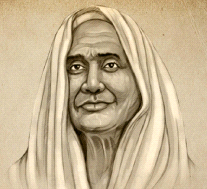Matangini Hazra, a name whispered through the annals of Indian history, is a figure of paradoxes and profound defiance. Known as “Gandhi Buri,” she was neither a frail old lady nor merely a footnote in the broader struggle against colonial rule—she was a force, a whirlwind of rebellion draped in the quiet dignity of age. Born in 1870 in a small village of Bengal, her life was as unassuming as the village paths she once trod, until it wasn’t.

Matangini Hazra Fredom Fighter
Fast forward to 1942, the year that would immortalize her in the consciousness of a nation. The Quit India Movement was ablaze, a roaring fire of resistance against the British Raj. And in this fire, Matangini Hazra was a burning ember, refusing to be extinguished. At 73 years old, when most would be content with the comfort of reminiscence, she became the embodiment of relentless courage.
On a fateful day, she led a procession, the tricolor of India held high, her voice a melody of “Vande Mataram.” The British police, armed and ruthless, stood in her path. Shots rang out—cruel, heartless bullets aimed at silencing the spirit of resistance. But Matangini, defying the very essence of mortality, moved forward. Bloodied but undeterred, her frail body, now a testament to her indomitable will, marched on. It wasn’t the bullets that stopped her—it was death itself, and even then, she fell forward, the flag still gripped in her hands, as if the very land she sought to free was pulling her closer.
In death, she transcended the ordinary, becoming a symbol, a beacon of rebellion that outshone the darkness of oppression. Her story is not one of grand strategies or political maneuvers but of simple, unwavering resolve—a stark reminder that the power of a movement lies not just in its leaders but in its people, in the quiet defiance of a single, unyielding soul. Matangini Hazra didn’t just march toward freedom; she carved a path with her blood, leaving behind a legacy that would echo in the corridors of history long after the dust of colonial rule had settled.











One thought on “Matangini Hazra: A Revolutionary’s Relentless March (1870–1942)”